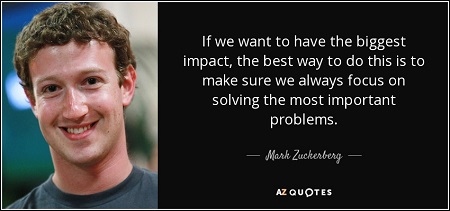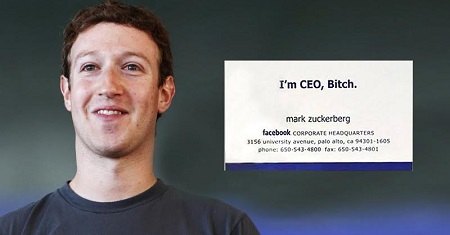 |
Chris Bell | 'The man on top of the mountain didn't fall there.' |
| - Vince Lombardi |
 |
Chris Bell | 'The man on top of the mountain didn't fall there.' |
| - Vince Lombardi |
SNHU - MBA-550 - Leading in an Organization
Written by: Chris Bell - May, 2017
Mark Zuckerberg's problem solving skills started with the creation of Facebook because people didn't have a way of expressing themselves online along with privacy options, and the ability to quickly share information with a network of friends, family and colleagues. The tools, methods and strategies he used were his knowledge, his computer and his unbelievable programming skills to create interactive software applications for people to use as a communication device. One thing to consider worthy of emulation with Mark is his quick and persistent ability to dedicate himself to a certain task. For example, before creating Facebook, Mark created a website within a few hours called FaceMash.com, in which he stole photos of numerous nearby databases in order for people to choose between two women based on beauty. The website got so much traffic that it shut down Harvard's network before its second day of existence. This example is also a problem solving skill of his to avoid because he hacked and stole photos instead of taking them himself and getting permission to use them online.
"If you want to build something great, you should focus on what the change is that you want to make in the world," Zuckerberg said. "I see too many entrepreneurs who decide that they want to start a company before they actually know what it is that they want to build. To me, that seems backwards. -Mark Zuckerberg (Elkins, 2016)"
 Upon building Facebook, or any business in general, Mark came across a plethora of problems to solve, questions to answer and people to direct. My father is a small business owner since 1988 and we now conduct $8 million in sales per year. I often remind him to think about all of the times he's had to say Yes or No to someone in the past 25 years, and how different things could be if one of those answers had been different at any time. Mark has created an environment with minimal internal conflict based on being the company with the highest employee satisfaction rating over and above Google, based on an article on Lifehack, 10 Reasons Why 99% of Facebook Employees Love Mark Zuckerberg. CEOs, especially young and growing CEOs, are scrutinized by the public eye and forced to be transparent with every move, so getting a high level rating as searched online is incredibly difficult to obtain without being a great problem solver. Most of the work executives do is based on decision making and problem solving, so the success of his company is proof in itself that he has the ability to address and solve big problems.
Upon building Facebook, or any business in general, Mark came across a plethora of problems to solve, questions to answer and people to direct. My father is a small business owner since 1988 and we now conduct $8 million in sales per year. I often remind him to think about all of the times he's had to say Yes or No to someone in the past 25 years, and how different things could be if one of those answers had been different at any time. Mark has created an environment with minimal internal conflict based on being the company with the highest employee satisfaction rating over and above Google, based on an article on Lifehack, 10 Reasons Why 99% of Facebook Employees Love Mark Zuckerberg. CEOs, especially young and growing CEOs, are scrutinized by the public eye and forced to be transparent with every move, so getting a high level rating as searched online is incredibly difficult to obtain without being a great problem solver. Most of the work executives do is based on decision making and problem solving, so the success of his company is proof in itself that he has the ability to address and solve big problems.
During the early years of Facebook, Mark was young and had a demanding way of leading and directing employees. Noah Kagan spoke out to Business Insider by saying that Mark would threaten employees to motivate them and get very angry when they didn't meet his expectations, "He had some great motivational lines. With love, he'd say "If you don't get that done sooner, I will punch you in the face," or "I will chop you with this huge sword," while holding a huge sword in hand. [says Noah] (Shontell, 2014)" Apparently Mark threw a cup of water on someone's computer after giving a poor presentation to him for a new application. Mark was just trying to create something cool and popular instead of creating a corporation, so his tactics towards conflict management and leadership weren't quite on point until much later. "Over the next several weeks, Reed noticed a real change in Zuckerberg: Not only did he agree to start seeing an executive coach but he called for weekly "all-hands" meetings in which he shared his thoughts and his vision with all of the employees. He started having more meetings with his executive team. Almost immediately, things improved. (Walter, 2013)" Mark started to realize that his employees were his biggest asset.
 Negotiation was a much easier skill for Zuckerberg to grasp because he was always on the power side of the deal. His desire to build something cool instead of something profitable allowed him to turn down deals and offers that may have actually been to his benefit because he simply wanted to keep the company. He was also able to negotiate excellent advertisement campaigns because, again, he didn't want ads on his website because he felt his customers would begin to hate using Facebook. So, advertisers began to make better offers that became difficult to refuse for Mark, and therefore, worked out in Mark's favor. He has been compared to Steve Jobs in terms of quality of his product/service, and whenever Mark enters a negotiation he has his customers and his service in mind rather than a profitable deal. Whereas, those on the other side of the negotiation probably enter into the conversation discussing money, profits and bottom line which is clearly not to their benefit.
Negotiation was a much easier skill for Zuckerberg to grasp because he was always on the power side of the deal. His desire to build something cool instead of something profitable allowed him to turn down deals and offers that may have actually been to his benefit because he simply wanted to keep the company. He was also able to negotiate excellent advertisement campaigns because, again, he didn't want ads on his website because he felt his customers would begin to hate using Facebook. So, advertisers began to make better offers that became difficult to refuse for Mark, and therefore, worked out in Mark's favor. He has been compared to Steve Jobs in terms of quality of his product/service, and whenever Mark enters a negotiation he has his customers and his service in mind rather than a profitable deal. Whereas, those on the other side of the negotiation probably enter into the conversation discussing money, profits and bottom line which is clearly not to their benefit.
"When Facebook CEO Mark Zuckerburg acquires a startup, he doesn't seem to like consulting his advisors first. (CEO.com Staff, 2013)" The article goes on to say that there was a $1 billion negotiation with Instagram, for which Zuckerberg made his lawyers stay inside his home while he ate steak and ice cream on the back patio with Instagram CEO Kevin Systrom. "Facebook's board of directors was also kept in the dark, only hearing about the transaction a few days before the company's announcement. (CEO.com, 2013)" These types of transactions further prove that Mark likes to make popular services instead of caring about the initial profits. He envisions a long term strategy of people using his services and assumes that money will soon follow suit, instead of the other way around.
References:CEO.com Staff. (2013). 9 Negotiation Tactics From Famous CEOs. Retrieved from:http://www.ceo.com/strategy/9-negotiation-tactics-from-famous-ceos/ Elkins, K. (2016). Facebook's Mark Zuckerberg says the most successful entrepreneurs share 3 traits. Retrieved from: http://www.cnbc.com/2016/09/02/facebook-mark-zuckerberg-successful-entrepreneurs-share-3-traits.html Kux, S. (n.d.). 10 Reasons Why 99% of Facebook Employees Love Mark Zuckerberg. Retrieved from: http://www.lifehack.org/articles/work/10-reasons-why-99-facebook-employees-love-mark-zuckerberg.html Shontell, A. (2014). Young Mark Zuckerberg Allegedly Threw Water On An Engineer's Computer And Threatened Employees With A Samurai Sword. Retrieved from: http://www.businessinsider.com/mark-zuckerberg-early-management-tactics-and-temper-2014-8 Walter, E. (2013). Management Lessons You Can Learn from Mark Zuckerberg. Retrieved from: https://www.bookish.com/articles/management-lessons-you-can-learn-from-mark-zuckerberg/ |